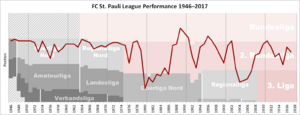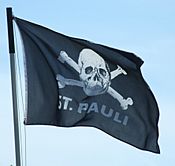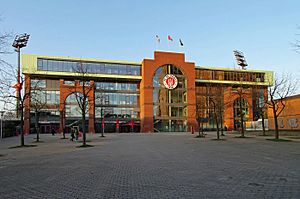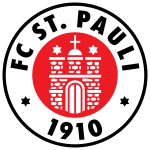FC St. Pauli facts for kids
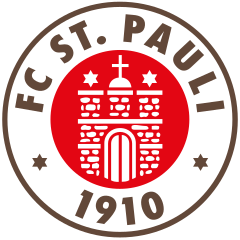 |
||||
| Full name | Fußball-Club St. Pauli von 1910 e.V. | |||
|---|---|---|---|---|
| Nickname(s) | Kiezkicker (Neighbourhood Kickers) Freibeuter der Liga (League Buccaneers) |
|||
| Founded | 15 May 1910 | |||
| Ground | Millerntor-Stadion | |||
| Capacity | 29,546 | |||
| President | Oke Göttlich | |||
| Head coach | Alexander Blessin | |||
| League | 2. Bundesliga | |||
| 2020–21 | 2. Bundesliga, 10th of 18 | |||
|
||||
FC St. Pauli is a German professional football club. It is based in the St. Pauli area of Hamburg. The team plays in the Bundesliga, which is Germany's top football league. They were promoted to the Bundesliga for the 2024–25 season.
The football team is part of a bigger sports club. This club also has teams for rugby, baseball, bowling, boxing, chess, cycling, handball, roller derby, skittles, softball, table tennis, and marathon. As of April 2023, FC St. Pauli has over 30,000 members.
The men's professional football team played in the third-highest German league, the Regionalliga, from 2003 to 2007. In 2007, they moved up to the 2. Bundesliga, the second-highest league. In 2010, they were promoted to the Bundesliga. After being relegated, they played in the 2. Bundesliga until the 2023–24 season. They then earned promotion back to the Bundesliga.
FC St. Pauli has a big rivalry with Hamburger SV. Their matches are called the Hamburger Stadtderby. The club is also known for its unique social culture. It has many fans and is seen as one of Germany's "Kult" clubs. FC St. Pauli and its fans are known for supporting left-wing politics.
Contents
Club History
How the Club Started
The club began in 1899 as a group of football fans. They were part of a larger sports club called Hamburg-St.Pauli Turn-Verein 1862. Their first match was in 1907. The club officially started on 15 May 1910. It was first called St. Pauli TV. In 1924, a separate football club named St. Pauli was formed.
The team was not very successful in its early years. They played in lower leagues. In 1934, they reached the top league, the Gauliga Nordmark. This was one of the main leagues created under the Third Reich. They were quickly relegated but returned in 1936. St. Pauli played in the Gauliga Hamburg until World War II ended.
After the War
After World War II, the club started playing in the Oberliga Nord in 1947. They finished second in the 1947–48 season. This led St. Pauli to play in the national championship for the first time. They reached the semi-finals but lost to 1. FC Nürnberg. The club played well in the early 1950s. However, they could not beat their rivals Hamburger SV. They finished second many times.
Reaching the Bundesliga
In 1963, the Bundesliga was created. This was West Germany's new top professional league. St. Pauli played in the second-tier league, the Regionalliga Nord. In 1964, they won their division. However, they could not get promoted to the top league. They won the Regionalliga Nord title again in 1966. But they still missed out on promotion.
In 1974, the 2. Bundesliga was formed. St. Pauli joined this new second-tier league. In 1977, they won their division and moved up to the Bundesliga. They stayed in the top league for one season.
In 1979, the club faced money problems. They were sent down to the Oberliga Nord (III). By 1984, the club was doing better financially. They returned to the 2. Bundesliga.
"Kult" Club Status
In the mid-1980s, St. Pauli became a "Kult" club. This means they gained a very special and loyal following. Their stadium is in the dock area, near Hamburg's famous Reeperbahn. This area is known for its nightlife. An alternative fan group started to grow. These fans were known for their left-leaning views and social activism. Matches became like big parties.
St. Pauli was the first German team to officially ban right-wing nationalist activities in its stadium. This happened when football hooliganism was a problem in Europe. In 1981, only about 1,600 people came to their games. By the late 1990s, their 20,000-capacity stadium was often sold out.
Fans started using the skull and crossbones as their unofficial symbol in the 1980s. The story says a punk band singer brought a skull and crossbones flag to a game. Other fans liked it and brought similar flags. In 1989, a local artist created a skull and crossbones image with "ST. PAULI" written below it. This image became very popular with fans. In 1999, the club bought the rights to this image. It became an official club logo.
The media started noticing the club's "Kult" image in the early 1990s. They focused on the punk fans. They gave the club nicknames like "Freibeuter der Liga" ("Buccaneers of the League").
St. Pauli moved between the Bundesliga and 2. Bundesliga several times. They were in the Bundesliga from 1988 to 1991, and again from 1995 to 1997.
Into the New Millennium
In the 2001–02 season, St. Pauli played in the top league again. They famously beat Bayern Munich, who were world champions at the time. This led to popular "Weltpokalsiegerbesieger" ("World Club Champion beaters") shirts. However, the team finished last and was relegated.
The club faced financial trouble again in 2003. They started a fundraising campaign called "Retteraktion" (Rescue Action). They sold "Retter" (rescuer) t-shirts. Over 140,000 were sold in six weeks. They also played a special game against Bayern Munich to raise money.
The club is also involved in charity. In 2005, they started the Viva con Agua de Sankt Pauli campaign. This campaign raises money for clean water projects in places like Cuba and Rwanda.
In the 2005–06 German Cup, the team did very well. They beat Bundesliga teams like Hertha BSC and Werder Bremen. Reaching the semi-finals earned the club about €1 million. This helped save the club from financial ruin. They lost to Bayern Munich in the semi-finals.
After success in the 2006–07 season, the team was promoted to the 2. Bundesliga. In the 2009–10 season, they were promoted back to the Bundesliga. On 16 February 2011, St. Pauli beat their rivals Hamburger SV away from home. This was the first time since 1977. However, the team finished last in the league and was relegated again. Since then, they played in the 2. Bundesliga until the 2023–24 season. They were then promoted back to the Bundesliga.
Football Cooperative St. Pauli von 2024 eG
To make sure the club's finances are strong, the club decided to create the Football Cooperative St. Pauli von 2024 eG. This cooperative allows fans and members to buy shares. Each share costs 750 euros plus a fee. The club hopes to get 20,000 to 30,000 shareholders. This could raise up to 30 million euros. The money will be used to buy a majority share in the company that runs the Millerntor stadium. It will also help pay off existing loans. Members of the cooperative have a say in decisions, following a "one man, one vote" rule. This is the first cooperative of its kind in German professional football.
Colours and Kit
The main colours of FC St. Pauli are brown and white. Red and black are also often used.
The club has worn brown and white since 1910. Their early uniforms had brown shirts and socks with white shorts. Later, they started wearing white shirts, brown shorts, and brown socks. In the 1960s, white socks were sometimes used. The club started adding patterns to their shirts in 1968.
From the 2007–08 season, St. Pauli has mostly worn all-brown home kits. Between 2019–20 and 2021–22, LGBT details were added to the third shirt. In 2020, St. Pauli started its own brand called Di!Y. Since the 2021–22 season, St. Pauli has worn kits made by Di!Y.
Sponsors
| Period | Brand | Sponsor |
| 1975–1976 | Hummel | Lüder Bauring |
| 1976–1977 | Adidas | |
| 1977–1978 | Minolta | |
| 1978–1979 | Lüder Bauring | |
| 1979–1980 | – | |
| 1980–1981 | Puma | |
| 1981–1982 | Block House | |
| 1982–1983 | – | |
| 1983–1984 | Klein-Kleckersdorf | |
| 1984–1991 | Deutscher Ring | |
| 1991–1992 | Diadora | |
| 1992–1994 | Patrick | |
| 1994–1995 | Reusch | |
| 1995–1997 | Böklunder | |
| 1997–2000 | Puma | Jack Daniels |
| 2000–2001 | Kappa | World of Internet/Astra |
| 2001–2003 | Securvita | |
| 2003–2005 | Stanno | Mobilcom |
| 2005–2006 | Do You Football | |
| 2006–2009 | Congstar | |
| 2009–2010 | Dacia | |
| 2010–2013 | Fernsehlotterie | |
| 2013–2014 | Relentless | |
| 2014–2016 | Hummel | Congstar |
| 2016–2021 | Under Armour | |
| 2021–2024 | Di!Y | |
| 2024– | Puma |
Stadium
FC St. Pauli plays its home games at the Millerntor-Stadion. Building the stadium started in 1961. It was finished in 1963. It first held 32,000 fans. The capacity was later lowered for safety.
In 1970, the stadium was named Wilhelm Koch-Stadium. This was to honor a former club president. However, it was found that Wilhelm Koch had been a member of the Nazi Party. This was a very bad political group. After protests from fans, the name was changed back to Millerntor-Stadion in 1999.
The stadium was rebuilt starting in 2006. The new north stand was finished in July 2015. The stadium can now hold 29,546 spectators. This includes 16,940 standing places and 12,606 seats.
The stadium is near the Heiligengeistfeld. You can reach it by the Hamburg U-Bahn line U3.
Supporters
St. Pauli is famous for its fans' left-leaning views. Most fans are anti-racist, anti-fascist, anti-homophobic, and anti-sexist. This has sometimes caused problems with neo-Nazis and hooligans at away games. The club has officially stated its opposition to racism, fascism, sexism, and homophobia. This is even part of its rules. Fans often join protests in the St. Pauli area of Hamburg. These protests are about things like housing. The main place for fan activities is the Fanladen St. Pauli.
St. Pauli fans have strong friendships with supporters of other clubs. These include Bayern Munich (Schickeria), Werder Bremen, Ternana, Club Universidad Nacional, Unione Calcio Sampdoria, Rayo Vallecano, SV Babelsberg 03, Hapoel Tel Aviv, AEK Athens, Olympique Marseille, Celtic, Venezia, Cosenza, Standard Liège and Clapton CFC.
The club is proud to have the most female fans in German football. In 2002, ads for a men's magazine were removed from the stadium. Fans protested because the ads showed women in a sexist way. In 2011, the club stopped certain performances in a corporate suite after fans complained.
St. Pauli is also a worldwide symbol for punk music and related styles. The skull and crossbones logo is often worn by famous artists. Bands like Asian Dub Foundation, Gaslight Anthem, Panteon Rococo, and Molotov (band) have worn it. KMFDM frontman Sascha Konietzko is a big St. Pauli fan. The American punk band Anti-Flag has worn St. Pauli shirts in music videos. Andrew Eldritch from The Sisters of Mercy is also a supporter. Georg Holm from Sigur Rós has worn a St. Pauli shirt at festivals. Alex Rosamilia from The Gaslight Anthem often wears St. Pauli gear. Editors guitarist Chris Urbanowicz also wears the skull and crossbones t-shirt.
Some bands have made music about St. Pauli. The Norwegian punk rock band Turbonegro recorded a special version of a song for St. Pauli. In 2009, the Italian band Talco wrote the song "St. Pauli". The team now uses this song as an anthem. Talco has played concerts at Millerntor-Stadion. The Glasgow band The Wakes wrote "The Pirates of the League" about the club. British band Art Brut also has a song called "St Pauli". In 2010, for the club's 100th anniversary, a fan club recorded "Happy Birthday St Pauli, One Hundred Beers for You".
In 2017, FC St. Pauli started working with the Irish-American Celtic punk band Dropkick Murphys. They released a special record of the song "You'll Never Walk Alone".
St. Pauli's home games at the Millerntor-Stadion often have more fans than other teams in the second division. In 2006, St. Pauli had more season ticket holders than many top-league teams. One study said the team had about 11 million fans across Germany. This makes them one of the most recognized German clubs. The number of official fan clubs grew to over 500 in 2011.
Club Culture
St. Pauli starts its home matches with "Hells Bells" by AC/DC. After every home goal, "Song 2" by Blur is played.
The club has played pre-season games at Wacken Open Air, a heavy metal festival.
In 2006, the club hosted the 2006 FIFI Wild Cup. This was a tournament for national football teams that are not officially recognized. Teams like Greenland and Tibet played. St. Pauli participated as the "Republic of St Pauli".
In 2008, Nike made two special Dunk shoes for the club. They were released in limited numbers.
Fundamental Principles
St. Pauli was the first club in Germany to have a set of Fundamental Principles (Leitlinien). These rules guide how the club is run. They were approved by members in 2009.
The first five principles say that:
- St. Pauli FC is part of society. It is affected by social changes in politics, culture, and society.
- St. Pauli FC knows its social responsibility. It supports its members, staff, and fans in sports and other areas.
- St. Pauli FC is the club of a specific city district. This gives it its identity. It has a social and political responsibility to the district and its people.
- St. Pauli FC wants to share a certain feeling about life. It stands for real sports. People can connect with the club even if it doesn't always win. Important parts of the club that create this feeling should be honored and kept.
- Being tolerant and respectful to each other is a key part of the St. Pauli way of thinking.
Players
Current squad
|
|
FC St. Pauli II
|
|
Notable Players
International Players
The following international players have also played for St. Pauli:
 Yakubu Adamu
Yakubu Adamu Moudachirou Amadou
Moudachirou Amadou Gerald Asamoah
Gerald Asamoah Zlatan Bajramović
Zlatan Bajramović Deniz Barış
Deniz Barış Jonathan Beaulieu-Bourgault
Jonathan Beaulieu-Bourgault Alfred Beck
Alfred Beck Morten Berre
Morten Berre Mourad Bounoua
Mourad Bounoua Paul Caligiuri
Paul Caligiuri Armando Cooper
Armando Cooper Cory Gibbs
Cory Gibbs Marc Gouiffe à Goufan
Marc Gouiffe à Goufan Joe Gyau
Joe Gyau Heino Hansen
Heino Hansen Ari Hjelm
Ari Hjelm Junior Hoilett
Junior Hoilett Uğur İnceman
Uğur İnceman Henry Isaac
Henry Isaac Ivan Klasnić
Ivan Klasnić Ante Budimir
Ante Budimir Ivo Knoflíček
Ivo Knoflíček Ján Kocian
Ján Kocian Max Kruse
Max Kruse James Lawrence
James Lawrence Alireza Mansourian
Alireza Mansourian Michael Mason
Michael Mason Frantz Mathieu
Frantz Mathieu Artur Maxhuni
Artur Maxhuni Michél Mazingu-Dinzey
Michél Mazingu-Dinzey Karl Miller
Karl Miller Kazuo Ozaki
Kazuo Ozaki Tore Pedersen
Tore Pedersen Miguel Francisco Pereira
Miguel Francisco Pereira Michael Gregoritsch
Michael Gregoritsch Fafà Picault
Fafà Picault Nikolai Pisarev
Nikolai Pisarev Andriy Polunin
Andriy Polunin Ingo Porges
Ingo Porges Christian Rahn
Christian Rahn Yuri Savichev
Yuri Savichev Helmut Schön
Helmut Schön Feiz Shamsin
Feiz Shamsin Rocky Siberie
Rocky Siberie Waldemar Sobota
Waldemar Sobota Ive Sulentic
Ive Sulentic Charles Takyi
Charles Takyi Jean-Clotaire Tsoumou-Madza
Jean-Clotaire Tsoumou-Madza Niels Tune-Hansen
Niels Tune-Hansen Yang Chen
Yang Chen Carlos Zambrano
Carlos Zambrano Ryo Miyaichi
Ryo Miyaichi Sáu Dũng
Sáu Dũng
Greatest Ever Team
In 2010, fans voted for the best players in the club's history:
 Klaus Thomforde
Klaus Thomforde André Trulsen
André Trulsen Walter Frosch
Walter Frosch Karl Miller
Karl Miller Dirk Dammann
Dirk Dammann Michél Mazingu-Dinzey
Michél Mazingu-Dinzey Thomas Meggle
Thomas Meggle Jürgen Gronau
Jürgen Gronau Harald Stender
Harald Stender Peter Osterhoff
Peter Osterhoff Franz Gerber
Franz Gerber
Coaching Staff
Managerial History
 Walter Risse (1950–52)
Walter Risse (1950–52) Hans Appel (1952)
Hans Appel (1952) Otto Westphal (1963–64)
Otto Westphal (1963–64) Kurt Krause (1964–65)
Kurt Krause (1964–65) Erwin Türk (1970–71)
Erwin Türk (1970–71) Edgar Preuß (1971–72)
Edgar Preuß (1971–72) Karl-Heinz Mülhausen (1972–74)
Karl-Heinz Mülhausen (1972–74) Kurt Krause (1974–76)
Kurt Krause (1974–76) Diethelm Ferner (1976–78)
Diethelm Ferner (1976–78) Sepp Piontek (1978–79)
Sepp Piontek (1978–79) Michael Lorkowski (1982–86)
Michael Lorkowski (1982–86) Willi Reimann (1986–87)
Willi Reimann (1986–87) Helmut Schulte (1987–91)
Helmut Schulte (1987–91) Horst Wohlers (1991–92)
Horst Wohlers (1991–92) Josef Eichkorn (1992)
Josef Eichkorn (1992) Michael Lorkowski (1992)
Michael Lorkowski (1992) Josef Eichkorn (1992–94)
Josef Eichkorn (1992–94) Uli Maslo (1994–97)
Uli Maslo (1994–97) Klaus-Peter Nemet (1997)
Klaus-Peter Nemet (1997) Eckhard Krautzun (1997)
Eckhard Krautzun (1997) Gerhard Kleppinger (1997–99)
Gerhard Kleppinger (1997–99) Willi Reimann (1999–00)
Willi Reimann (1999–00) Dietmar Demuth (2000–02)
Dietmar Demuth (2000–02) Joachim Philipkowski (2002)
Joachim Philipkowski (2002) Franz Gerber (2002–04)
Franz Gerber (2002–04) Andreas Bergmann (2004–06)
Andreas Bergmann (2004–06) Holger Stanislawski (2006–07)
Holger Stanislawski (2006–07) André Trulsen (2007–08)
André Trulsen (2007–08) Holger Stanislawski (2008–11)
Holger Stanislawski (2008–11) André Schubert (2011–12)
André Schubert (2011–12) Michael Frontzeck (2012–13)
Michael Frontzeck (2012–13) Roland Vrabec (2013–14)
Roland Vrabec (2013–14) Thomas Meggle (2014)
Thomas Meggle (2014) Ewald Lienen (2014–2017)
Ewald Lienen (2014–2017) Olaf Janßen (2017)
Olaf Janßen (2017) Markus Kauczinski (2017–19)
Markus Kauczinski (2017–19) Jos Luhukay (2019–20)
Jos Luhukay (2019–20) Timo Schultz (2020–22)
Timo Schultz (2020–22) Fabian Hürzeler (2022–24)
Fabian Hürzeler (2022–24) Alexander Blessin (2024–)
Alexander Blessin (2024–)
Honours
League Titles
- 2. Bundesliga (Second Division)
- Champions: 1977(Nord), 2023–24
- Runners-up : 1987–88, 1994–95, 2009–10
- Regionalliga Nord (Second Division)
- Champions : 1963–64, 1965–66, 1971–72, 1972–73
- Regionalliga Nord (Third Division)
- Champions : 2007
- Oberliga Nord (Third Division)
- Champions : 1981, 1983, 1986
- Stadtliga Hamburg (First Division)
- Champions : 1947
Cup Wins
- Hamburger Pokal
- Winners: 1986, 1998, 2001, 2004, 2005, 2006, 2008
Reserve Team Achievements
- Oberliga Hamburg/Schleswig-Holstein (Fourth Division)
- Champions: 1995, 1999, 2003
- Oberliga Hamburg (Fifth Division)
- Champions: 2011
- Hamburger Pokal
- Winners: 1998, 2001, 2008, 2009, 2010
Records
Note: FC St. Pauli did not play in the Bundesliga or the 2. Bundesliga during certain periods: 1974, 1979–1984, 1985–86 and 2003–2007. Statistics are correct as of 22 June 2022.
Most Appearances Overall
BL = Bundesliga, 2.BL = 2. Bundesliga, OLN = Oberliga Nord (1947–1963), RLN = Regionalliga Nord (1963–1974) OtL = Other leagues: Oberliga Nord (1974–1994), Regionalliga Nord (since 1994) Cup = DFB-Pokal, OtC = Other competitions: German championship (1947–1951), Relegation play-offs, Hamburg Cup
| Rank | Name | First | Last | BL | 2.BL | OLN | RLN | OtL | Cup | OtC | Total |
|---|---|---|---|---|---|---|---|---|---|---|---|
| 1 | 1981 | 1997 | 117 | 202 | – | – | 112 | 21 | 24 | 476 | |
| 2 | 1986 | 2005 | 177 | 206 | – | – | 1 | 20 | 5 | 409 | |
| 3 | 1983 | 1998 | 100 | 217 | – | – | 42 | 17 | 13 | 389 | |
| 4 | 1947 | 1960 | – | – | 336 | – | – | 5 | 15 | 356 | |
| 5 | 1956 | 1968 | – | – | 166 | 147 | – | 3 | 12 | 328 | |
| 6 | 1958 | 1970 | – | – | 138 | 170 | – | 3 | 9 | 320 | |
| 7 | 1960 | 1970 | – | – | 78 | 223 | – | 3 | 11 | 315 | |
| 8 | 1983 | 1991 | 98 | 107 | – | – | 62 | 10 | 16 | 293 | |
| 9 | 2003 | 2014 | 28 | 141 | – | – | 103 | 19 | 1 | 292 | |
| 10 | 1982 | 1991 | 65 | 97 | – | – | 97 | 8 | 22 | 289 |
Most Appearances in Bundesliga and 2. Bundesliga
| Rank | Name | Years | Bundesliga | 2. Liga | Total |
|---|---|---|---|---|---|
| 1 | 1986–1991, 1994–2002 | 177 | 206 | 383 | |
| 2 | 1984–1997 | 117 | 202 | 319 | |
| 3 | 1984–2000 | 100 | 217 | 317 | |
| 4 | 1990–1999 | 81 | 179 | 260 | |
| 5 | 1993–2003 | 80 | 178 | 258 | |
| 6 | 1974–1979, 1984–1988 | 34 | 192 | 226 | |
| 7 | 1984–1991 | 98 | 107 | 205 | |
| 8 | 2014–2021 | – | 191 | 191 | |
| 9 | 2012–2022 | – | 190 | 190 | |
| 10 | 1994–2000 | 61 | 119 | 180 |
Top Goalscorers in Bundesliga and 2. Bundesliga
Numbers in brackets indicate appearances made.
| Rank | Name | Years | Bundesliga | 2. Liga | Total | Ratio |
|---|---|---|---|---|---|---|
| 1 | 1974–1975, 1984–1990 | 4 (27) | 59 (137) | 63 (164) | 0.38 | |
| 2 | 1976–1978, 1986–1988 | 16 (32) | 42 (73) | 58 (105) | 0.55 | |
| 3 | 1986–1991 | 20 (80) | 31 (90) | 51 (170) | 0.30 | |
| 4 | 1984–1991 | 25 (98) | 24 (107) | 49 (205) | 0.24 | |
| 5 | 2008–2013 | 3 (31) | 43 (107) | 46 (138) | 0.33 | |
| 6 | 1994, 1997–2000 | – | 40 (102) | 40 (102) | 0.39 | |
| 7 | 1991–1997 | 10 (49) | 29 (103) | 39 (152) | 0.26 | |
| 8 | 1974–1979 | 3 (25) | 33 (132) | 36 (157) | 0.23 | |
| 9 | 1993–1998 | 12 (46) | 20 (55) | 32 (101) | 0.32 | |
| 10 | 1974–1979 | 3 (23) | 28 (118) | 31 (141) | 0.22 |
Recent Seasons
The club's recent seasons:
| Year | Division | Position |
|---|---|---|
| 1999–2000 | 2. Bundesliga (II) | 13th |
| 2000–01 | 2. Bundesliga | 3rd (promoted) |
| 2001–02 | Bundesliga (I) | 18th (relegated) |
| 2002–03 | 2. Bundesliga (II) | 17th (relegated) |
| 2003–04 | Regionalliga Nord (III) | 8th |
| 2004–05 | Regionalliga Nord | 7th |
| 2005–06 | Regionalliga Nord | 6th |
| 2006–07 | Regionalliga Nord | 1st (promoted) |
| 2007–08 | 2. Bundesliga (II) | 9th |
| 2008–09 | 2. Bundesliga | 8th |
| 2009–10 | 2. Bundesliga | 2nd (promoted) |
| 2010–11 | Bundesliga | 18th (relegated) |
| 2011–12 | 2. Bundesliga | 4th |
| 2012–13 | 2. Bundesliga | 10th |
| 2013–14 | 2. Bundesliga | 8th |
| 2014–15 | 2. Bundesliga | 15th |
| 2015–16 | 2. Bundesliga | 4th |
| 2016–17 | 2. Bundesliga | 7th |
| 2017–18 | 2. Bundesliga | 12th |
| 2018–19 | 2. Bundesliga | 9th |
| 2019–20 | 2. Bundesliga | 14th |
| 2020–21 | 2. Bundesliga | 10th |
| 2021–22 | 2. Bundesliga | 5th |
| 2022–23 | 2. Bundesliga | 5th |
| 2023–24 | 2. Bundesliga | 1st (promoted) |
| 2024–25 | Bundesliga | 14th |
| 2025–26 | Bundesliga |
Other Sports
The St. Pauli club has several rugby teams for both men and women.
The men's rugby team has not won as many titles as the women's team. They reached the German final only once in 1964.
The women's rugby team has won the German rugby union championship eight times. They also won the sevens championship three times. Many of their players are on the national team.
St. Pauli also has a blind football team. They play in the Blindenfussball Bundesliga.
The club also has a Roller Derby team called Harbor Girls Hamburg.
The club's chess section plays in the German Chess Bundesliga. In 2024, they signed five-time World Champion Magnus Carlsen. Carlsen played his first match for St. Pauli on 11 January 2025.
Notable Presidents
- 1990–00: Heinz Weisener
- 2002–10: Corny Littmann
See also
 In Spanish: F.C. San Pauli para niños
In Spanish: F.C. San Pauli para niños
- Hamburg derby
 | Jessica Watkins |
 | Robert Henry Lawrence Jr. |
 | Mae Jemison |
 | Sian Proctor |
 | Guion Bluford |


